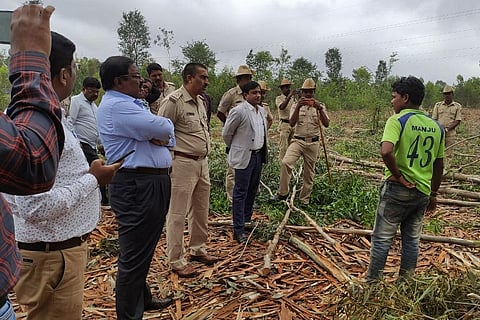

“I often got chest pain and I requested for two months to get treatment. I promised to return, but the owner did not let me go. He asked me, who will do your work when you’re gone?” laments an unnamed 26-year-old bonded labourer, who has now been rescued.
This was the reality of 19 workers in tree plantations in the town of Anekal, located two hours from Bengaluru city. Labourers were kept in the guise of returning advances paid, and were overworked with barely enough pay for basic food requirements. The government refers to such a condition as bonded labour: where the labourers are not allowed freedom of movement due to any debt or obligation, a severe human rights violation.
In the early hours of Saturday morning, district officials in Anekal along with social workers from the NGO International Justice Mission (IJM), rescued 19 labourers who were trapped in the hands of the traffickers for more than five years. Two labourers among them were minors. Along with these labourers, there were also 10 children who were between the ages of eight months to 17 years.
Acting on a tip-off from another rescued bonded labourer, the police quickly got into action beginning at 6 am, and began rescue operations. Rescuers report that these people were in a desperate condition. The labourers and children had wounds on their hands and feet, with no access to hospital facilities.
The labourers were initially given a large advance of up to Rs 60,000, and were promised good pay and accommodation facilities. But the same advance proved to be the shackles that kept them tied to their place of work.
The reality of living conditions was also starkly different to what they had been promised: they lived in makeshift tents with no sanitation facilities or food to eat.
Investigations and interviews were held on the same day, and the survivors were able to return to where they came from, within 24 hours of being rescued.
The labourers were all trafficked from Krishnagiri in Tamil Nadu, and worked as woodcutters, where they cut down Eucalyptus trees at plantations for two weeks at a stretch without a break. Eucalyptus trees are extremely useful for construction, as they are a fast-growing species, as well as sturdy.
Working days for the labourers would begin at 6 am and go on till 7 pm. They were initially promised a wage of Rs 600 per day, but were eventually given only about Rs 250 per week, which works out to Rs 35 per day of work. The current minimum daily wage for wood cutters in Karnataka is Rs 565 per day.
Indrajeet Pawar, director of operations, IJM, says that as part of rehabilitation efforts, the labourers are given Rs 20,000 as immediate rehabilitation from the government. However, they would need to wait until they can get documentation to start a bank account first, which would mean that the process of procuring the money is often delayed. He also stated quite emphatically that “IJM does not do rehabilitation programs, but we do offer psychological counselling as they recover from the trauma of bondage.”
He said that the labourers can also look forward to work from the MNREGA schemes from the Central government